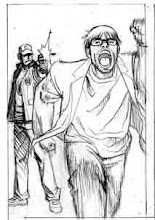The mythological hero, setting forth from his commonday hut or castle, is lured, carried away, or else voluntarily proceeds, to the threshold of adventure. There he encounters a shadow presence that guards the passage. The hero may defeat or conciliate this power and go alive into the kingdom of the dark (brother-battle, dragon-battle; offering, charm), or be slain by the opponent and descend in death (dismemberment, crucifixion). Beyond the threshold, then, the hero journeys through a world of unfamiliar yet strangely intimate forces, some of which severely threaten him (tests), some of which give magical aid (helpers). When he arrives at the nadir of the mythological round, he undergoes a supreme ordeal and gains his reward. The triumph may be represented as the hero's sexual union with the goddess-mother of the world (sacred marriage), his recognition by the father-creator (father atonement), his own divinization (apotheosis), or again - if the powers have remained unfriendly to him - his theft of the boon he came to gain (bride-theft, fire-theft); intrinsically it is an expansion of consciousness and therewith of being (illumination, transfiguration, freedom). The final work is that of the return. If the powers have blessed the hero, he now sets forth under their protection (emissary); if not, he flees and is pursued (transformation flight, obstacle flight). At the return threshold the transcendental powers must remain behind; the hero re-emerges from the kingdom of dread (return, resurrection). The boon that he brings restores the world (elixir).
The outlines of myths and tales are subject to damage and obscuration. Archaic traits are generally eliminated or subdued. Imported materials are revised to fit local landscape, custom, or belief, and always suffer in the process. Furthermore, in the inumerable retellings of a traditional story, accidental or intentional dislocations are inevitable. To account for elements that have become, for one reason or another, meaningless, secondary interpretations are invented, often with considerable skill.
When a civilization has passed from a mythological to a secular point of view, the older images are no longer felt or quite approved. The myths were read as superhuman romances.
Wherever the poetry of myth is interpreted as biography, history, or science, it is killed. The living images become only remote facts of a distant time or sky.

No comments:
Post a Comment